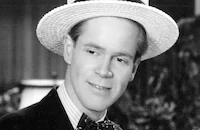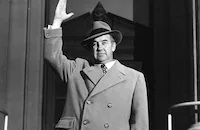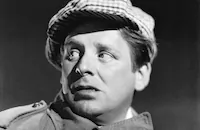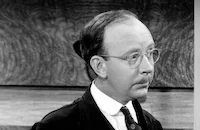Black Angel
Brief Synopsis
Cast & Crew
Roy William Neill
Dan Duryea
June Vincent
Peter Lorre
Broderick Crawford
Constance Dowling
Film Details
Technical Specs

Synopsis
Has-been alcoholic songwriter Martin Blair goes to Los Angeles exclusive Wilshire House apartments to visit his estranged wife, popular singer Marvis Marlowe, but is refused entrance by the doorman per Marvis' instructions. Martin sends up a gift of a small heart brooch and, while waiting outside the building, overhears a man receiving permission to see Marvis. Despondent, Martin goes to a bar to get drunk, then, as he often does, his friend Joe takes him home to his apartment and locks him in for the night. After midnight that same night, musician Kirk Bennett goes to see Marvis and, finding her apartment door unlocked and hearing her recording of "Heartbreak" playing, goes inside to wait. After a few moments, Bennett wanders around the apartment and finds Marvis in her bedroom, dead, with the brooch beside her. Bennett hurries out to use the phone, but upon hearing a noise coming from the bedroom, returns and notices the brooch is missing. Hoping to catch the culprit, Bennett hastens out to the hall and is promptly locked out when the door shuts. The next day police detective Captain Flood calls on Bennett and his wife, Cathy, a former singer, and Bennett admits that Marvis was blackmailing him. Bennett is tried and found guilty of Marvis' murder and sentenced to death. Determined to find some way to prove her husband's innocence, Cathy follows every lead based on each detail of Bennett's description of that evening. After discovering that Martin wrote "Heartbreak," Cathy locates him, only to find him in a drunken stupor. When Martin manages to admit he was outside the apartment that night, Cathy accuses him of the murder, until Joe arrives and explains that Martin was home, drunk. Feeling guilty about her outburst, Cathy leaves Martin some money. The next day, when sober, Martin goes to Cathy's home to return the money and Cathy describes her fruitless efforts to clear her husband. Upon seeing a photograph of Bennett, Martin tells Cathy that Bennett is not the man he saw enter the Wilshire House, and the two decide to work together to find the murderer. While going through Bennett's things, Cathy finds a personalized matchbook of Marvis' with a phone number on the inside flap. The number leads Cathy and Martin to the Rio nightclub, where Martin spots the man he observed at the Wilshire House, the club's owner, Mr. Marko. Using assumed names, Martin and Cathy arrange to audition for Marko as a nightclub act and are a popular addition to the club. One evening in Marko's office, Martin sees an envelope from Marvis' distinctive stationery in the safe and takes note of the combination. During their increasingly successful engagement at the Rio, Cathy becomes aware that Martin has stopped drinking and returned to writing music, composing one tune, "Time Will Tell," especially for her. Nervous about Martin's obvious growing attraction to her and the approach of Bennett's execution date, Cathy plants an item in the paper about Marko and Marvis, hoping to force Marko to tip his hand. That evening in his office, while Marko questions Cathy about the newspaper item, she eyes a locked box resting in the open safe. Noting her interest, Marko unlocks the box, which contains, to Cathy's disappointment, a star brooch, not the important heart brooch. Later, over Martin's protests, Cathy insists on returning to Marko's office to get Marvis' letter. Just before she does, she telephones Flood, certain she will have the necessary proof to reopen the investigation. Instead, Cathy is caught by Marko, who admits that he knows she is Bennett's wife and that Marvis was indeed blackmailing him, threatening to tell his teenage daughter about his criminal past, but that he had nothing to do with the murder. When Flood arrives and Cathy insists that Marko was the man Martin saw entering the Wilshire House, Flood reveals he was patroling the area and picked Marko up a full hour before the alleged murder time. Cathy is crushed and later when Martin visits her at home, admits she is at her wits end. Martin tells her that she should consider the possibility that Bennett is indeed guilty and confesses his love for her. When Cathy tells him she has appreciated his concern and help, but that she has only ever loved her husband, Martin leaves her apartment and goes on a drunken bender that lasts several days. The night before Bennett's execution, Martin finds himself in another bar, where he is greeted by an unfamiliar woman and is stunned to see her wearing the heart brooch. When he asks her where she got it, she reminds him that he gave it to her some months back. Martin claims she is lying, which provokes a brawl with the woman's escort. Martin is arrested and taken to the detox wing of the jail, where he has a flashback to the night of Marvis' murder and recalls that his building superintendent let him out of his apartment for money and that he returned to the Wilshire House and strangled Marvis. Martin confesses to the detox doctor, who admits that alcoholic amnesia could be responsible for his memory blackout. Martin breaks out of jail and goes to Cathy's, only to find her absent. He phones Flood, then passes out in a drunken haze, clutching the brooch. When Cathy and Flood arrive, Martin confesses to them both, and Flood has Bennett's execution halted.

Director
Roy William Neill
Cast

Dan Duryea
June Vincent

Peter Lorre

Broderick Crawford
Constance Dowling

Wallace Ford

Hobart Cavanaugh

Freddie Steele
John Phillips
Ben Bard
Junius Matthews

Marion Martin
Michael Branden
St. Clair And Vilova
Robert Williams
Pat Starling
Wally Webb
Mary Field
Steve Olsen
Florence Auer
Eddy Chandler
Mauritz Hugo
Eula Guy
Dick Wessel
Clark Kuney
Ralph Brooks
Ann Lawrence
Shephard Houghton
Bob Crosby
Bud Lawler
Gary Delmar
Dorothy Granger
Chuck Hamilton
Crew
Jack Brooks
Bernard B. Brown
Roy Chanslor
Carmen Dirigo
Edgar Fairchild
Russell A. Gausman
Saul A. Goodkind
Charles S. Gould
D. S. Horsley
Paul Ivano
Raymond Kessler
Joe Lapis
Tom Mcknight
Roy William Neill
Martin Obzina
Jack Otterson
Jack P. Pierce
E. R. Robinson
Frank Skinner
Vera West

Film Details
Technical Specs

Articles
Black Angel
When John Phillips is unjustly convicted of a murder he didn't commit and police detective Broderick Crawford stops his investigation, Phillips' wife June Vincent carries on looking for the real killer. Her detective work leads her to the alcoholic Duryea, who decides to help her. In a truly crackpot story development, they masquerade as a singer-and-pianist performing duo to infiltrate the nightclub of Peter Lorre, who has aroused their suspicions. And along the way, Vincent and Duryea develop feelings for each other.
Black Angel is an unusual noir not just for its casting but for the fact that its oppressive fatalism isn't really clear until the end. Then it hits you, and you realize what a bleak world you've been immersed in for 81 minutes. Its look is beautifully atmospheric, thanks to the fine directing (and producing) of Roy William Neill. Neill had just produced and directed most of the Sherlock Holmes films starring Basil Rathbone, and any classic movie fan knows that those pictures are gorgeous to look at. Black Angel looks very similar. Tragically, Neill died of a heart attack, at age 59, just months after the release of Black Angel. It was his last film but a fine conclusion to a career that boasted over 100 directing credits dating back to 1917. Black Angel is also enjoyable for Peter Lorre - it's especially amusing, after Casablanca, to see him as the owner of a nightclub, even dressed in a white tuxedo a la Bogart.
Universal Home Video's DVD of Black Angel features a fine transfer with rich shades of black and grey and good sound. The only extra is a re-release trailer.
To order Black Angel, go to TCM Shopping.
by Jeremy Arnold

Black Angel
Quotes
Trivia
Notes
According to Hollywood Reporter news items, Ava Gardner was intially considered for the role of "Cathy," but due to scheduling constraints, Universal was forced to begin production before she was available and replaced her with June Vincent. An Los Angeles Times item indicated that Charles Laughton was scheduled to star in the film. Black Angel was the last film of director Roy William Neill, who died of a heart attack in November 1946. John Ireland, Anne Bancroft and Murvyn Vye appeared on a Lux Video Theatre adaptation of the story, broadcast on March 28, 1957.














